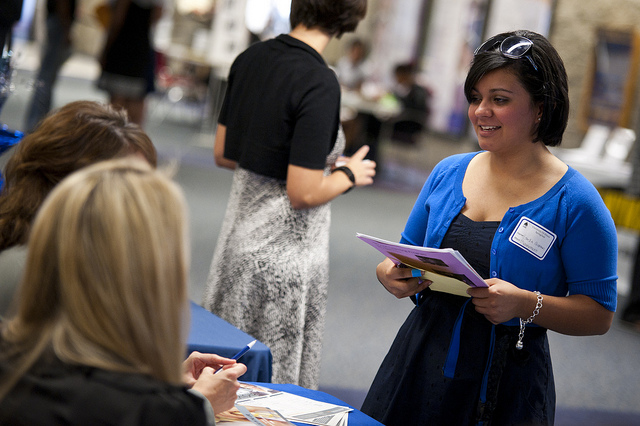
A new report predicts the Massachusetts workforce will look very different in twenty years. (Jeremy Wilburn/Flickr CC).
The number of adults in Massachusetts with a college degree will decline beginning in 2020. That's according to a new report released Monday from MassINC, an independent Boston think tank.
Ben Forman is research director at MassINC. For decades, says Forman, Massachusetts has been adding thousands of college graduates to the workforce. But, over the next decade, that increase is going to slow down and eventually decline.
"For the first time since that census data was collected in 1940 we'll end a decade with fewer college educated residents than Massachusetts began with," said Forman.
It's the perfect storm. As the Baby Boom Generation ages and retires, college degree attainments rates are slowing down.
The report raises concerns over whether Massachusetts will have the workforce it needs to support an economy highly dependent on educated workers.
"To the extent we don't have those workers as readily available as we've had in the past, it's going to be a challenge to grow those industries," said Forman.
However, some say the shift could actually be a good thing -- arguing that there's more college-educated workers than jobs that can accommodate them.
Massachusetts is the most educated state in the country. Thirty-three percent of the state's residents have at least a bachelor's degree. According to the report, educational attainment spiked dramatically in the state between 1990 and 2010, but that growth is now stagnating.
As the MassINC. report forecasts college attainment rates to stagnate, the city of Boston is trying to turn that prediction around.
On Tuesday, Mayor Marty Walsh will announce that the city is expanding its college completion program, Success Boston. With a $2.7 million federal grant, Boston Public Schools will offer college coaching to an additional 1,000 high school students.
The Boston Foundation and city leaders say the grant will help expand solutions to challenges facing low-income communities across the state and country. For the BPS Class of 2009, the Foundation reports, the 1-to-4 year persistence rates of those who participated in the program are about 20 points higher than the comparison group of BPS students. The numbers are similar for the Class of 2010 and 2011.










